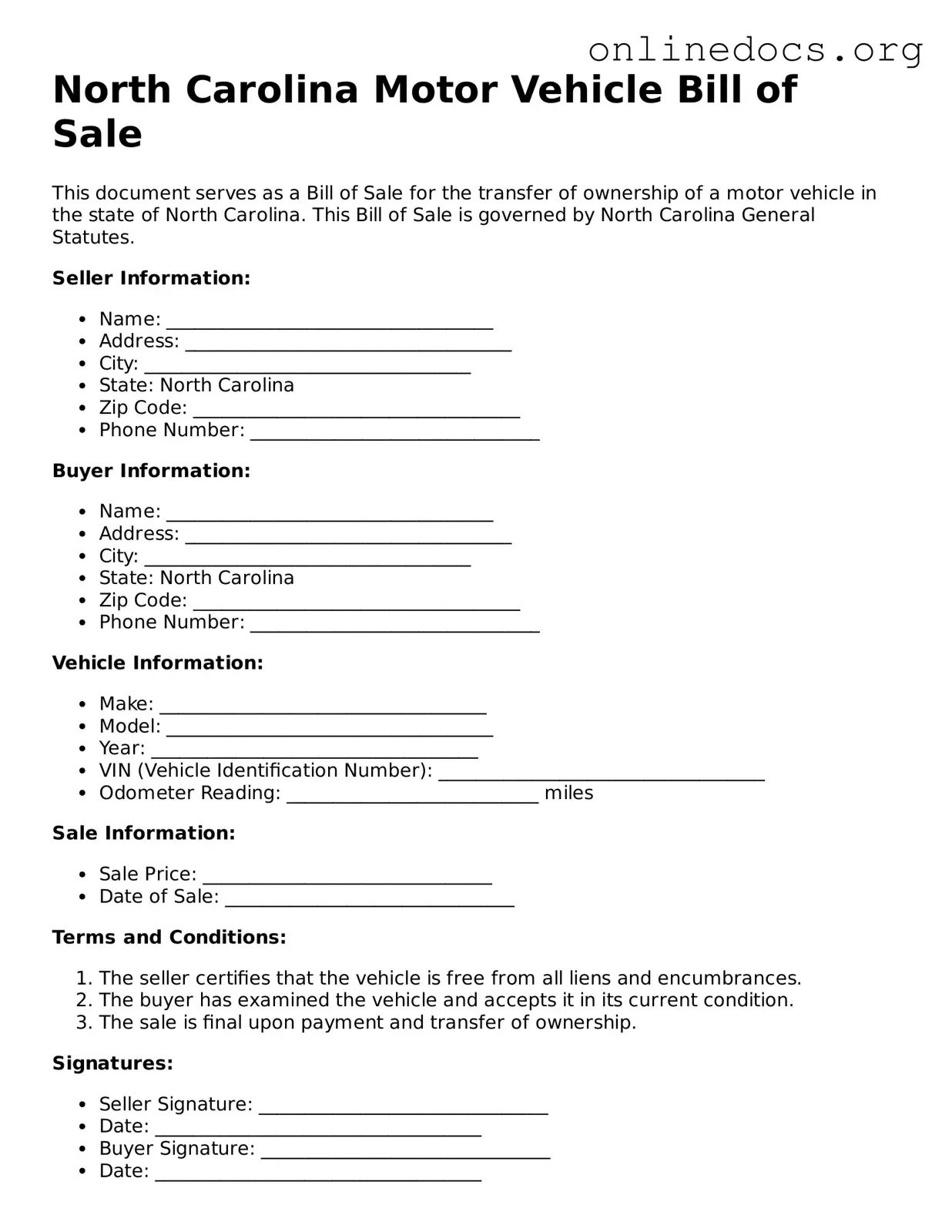The North Carolina Motor Vehicle Bill of Sale form shares similarities with a standard Bill of Sale used in various transactions. Both documents serve to transfer ownership of an item from one party to another. They typically include details such as the names of the buyer and seller, a description of the item, and the sale price. This ensures that both parties have a clear record of the transaction, which can be important for legal and tax purposes.
Another document that resembles the Motor Vehicle Bill of Sale is the Boat Bill of Sale. Like the vehicle bill, this form is used to transfer ownership of a boat. It includes essential information such as the vessel's identification number, make, model, and the names of the buyer and seller. Both documents protect the interests of both parties and provide proof of ownership transfer.
The Motorcycle Bill of Sale is also similar to the Motor Vehicle Bill of Sale. It serves the same purpose: to document the sale of a motorcycle. This document includes details such as the motorcycle's VIN, make, model, and the sale price. By having this form, both the buyer and seller have a written record that can help resolve any future disputes regarding ownership.
A trailer Bill of Sale is another document that functions similarly. It is used when a trailer is sold or transferred. This form captures the necessary details about the trailer, including its VIN, make, and model, along with the buyer's and seller's information. Like the vehicle bill, it provides a clear record of the transaction, which can be important for registration and legal purposes.
The importance of maintaining proper documentation cannot be overstated, particularly in real estate transactions and personal property sales. Legal forms such as the California Bill of Sale ensure that buyers and sellers are protected during ownership transfers. For anyone looking to navigate the complexities of these processes, consider accessing resources available at All Templates PDF for comprehensive assistance.
The Home Bill of Sale is comparable in that it documents the sale of a home or real estate property. While it involves different types of assets, it similarly outlines the terms of the sale, including the names of the parties involved and the sale price. Both documents aim to provide legal protection and clarity for the parties involved in the transaction.
A personal property Bill of Sale is another related document. This form is used for the sale of various personal items, such as furniture or electronics. It serves to record the transaction details, ensuring both parties have a written agreement that can help avoid misunderstandings in the future. Like the vehicle bill, it includes pertinent information about the item being sold.
The Lease Agreement can also be seen as similar in terms of documenting the transfer of rights. While it does not transfer ownership, it outlines the terms under which one party can use another's property. Both documents require clear identification of the parties involved and the specifics of the transaction, ensuring that all terms are understood and agreed upon.
The Assignment of Title document is closely related to the Motor Vehicle Bill of Sale. This form is necessary for transferring the title of a vehicle from the seller to the buyer. It provides legal proof of ownership change and is often required by state authorities for vehicle registration. Both documents work together to ensure a smooth transfer of ownership.
Finally, the Power of Attorney can be seen as a supporting document in vehicle transactions. It allows one person to act on behalf of another in legal matters, including the sale of a vehicle. While it does not document the sale itself, it can facilitate the process by giving the designated individual the authority to sign necessary documents, including the Bill of Sale.
